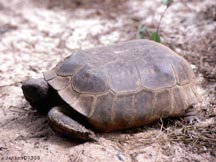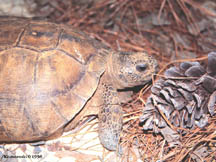
Altamaha Basin > Hydrology > Water Quality > Environmental Threats > Human Impacts > Cultural Features > Coastal Habitats > Tributaries > Plants > Animals > Sapelo Island |
||
| Molluscs > Reptiles > Fish > Birds > Mammals | ||||||||
Reptilia Gopher tortoise Gopherus polyphemus The only tortoise of the eastern U.S., the colloquially named "gopher" is a keystone species within the dry sandy areas it inhabits. That is, many other animals living within the same areas depend on the gopher tortoise to provide shelter by digging the deep burrows for which the species is named. In open, sandy habitats with grassy herbs present, the gopher tortoise is not difficult to locate within the Altamaha River basin. Tortoises are most numerous along the sand ridges north of the River, but have been observed both north and south of the River and in the Upper and Lower Coastal Plains. The species is long-lived, and its current numbers may mask low reproduction due to fragmentation of the population. Tortoises occur in both natural and anthropogenic communities, although their presence in the latter is often ephemeral due to fire suppression and lack of grassy forage in maturing pine plantations. Sixty records of this species reflect the high visibility of tortoise burrow mounds, and the species' preference for living near roads, where it may still forage on grasses despite fire suppression in adjacent habitats. The gopher tortoise has been recorded in 16 quads in nine counties within the study area. |
||||||||
 |
||||||||
 |
||||||||
| Click on the images for larger views. | ||||||||